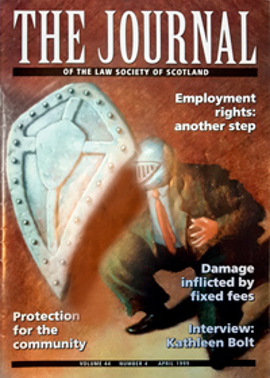Reshaping the criminal justice system
Three weeks after its official launch, the creation of the Scottish Criminal Cases Review Commission promises to fundamentally alter the landscape of the criminal justice system in Scotland.
“It was clear that there was a nationwide impetus to separate political elements from the criminal justice system. While there was no direct criticism of the existing system, the Commission is intended to enhance the process of investigating miscarriages of justice,” said Sheila Mclean.
The symbolic effect of separation from the Secretary of State is also intended to be supplemented by a practical improvement in the structure to adequately resolve miscarriages of justice, with the Commission employing more staff than have been available to the Secretary of State.
In assessing the likely impact of the Commission, the experience of the English system represents the most obvious parallel: “As a policy it was appropriate to be in line with England. There is a feeling that we have not had the number of high-profile miscarriages that had afflicted the English system over the years, but that wasn’t a reason to be complacent.”
Nevertheless, the early running of the English review commission has been tarnished by suggestions that under-funding and a greater than anticipated caseload have left it with a backlog of cases, possibly up to three years’ worth.
“In England, the structure is inevitably much bigger, and includes full-time commissioners to deal with several hundred cases. They’ve had a number of high-profile old cases, such as Derek Bentley and James Hanratty, to investigate which have been time-consuming and expensive.
“The Scottish Office is completely committed to this project and indeed our funding stands at a greater level than was recommended by the Sutherland Committee. In our first year we’re not expecting more than 30 or 40 cases, although now that our remit covers summary cases as well, this figure represents guess-work.”
The members of the SCCRC have visited the English operation and have been particularly impressed with their office management and informed IT purchasing. Chief Executive in Scotland Robert Eadie, who has returned from a post as an ombudsman in Western Australia to take up a position with the Commission, will monitor the need for an improved budget.
For solicitors seeking to present a petition on behalf of a client, the process begins by writing to the Commission, who will send out a form indicating the sort of information required to assist in assessing the merits of a case.
However, Sheila McLean is anxious not to second guess the view the Appeal Court is likely to take of references made by the Commission, preferring to make reference only to the legislation’s definition of what represents grounds for reference.
Questions remain to be answered as to the provision of legal aid and the prioritisation of cases. The Commission has pledged to be transparent and initially at least, intends to deal with cases in the order in which they come in.
“We’re keen that people aren’t kept waiting, but the key characteristics in deciding the urgency of a case will be if someone is still in prison, particularly if they have a long time to serve.”
To that end, the Commission intends to develop a web-site which could eventually enable prisoners to submit petitions by e-mail. The Commission’s case-workers are committed to investigating all claims that arrive at the office.
The new body has received support from senior law officers in Scotland and from the Law Society of Scotland, and Sheila McLean is encouraged that “there is a genuine sense that people want this to work”.
“It’s important for public confidence that we show that the legal system is taking miscarriages seriously. We will aim to be as clear as possible in giving reasons for our decisions and providing a response as efficiently as the availability and difficulty of evidence allows.
“The Commission will undertake an independent investigation, but with the assistance of the existing resources of the police and Crown Office.”
References can be made to the High Court whether or not an appeal has been heard. The Commission will also be pro-active in suggesting changes to the law, arising from their monitoring of any problems which in its assessment seem to be perennial.
Sheila McLean is clear about her aims for her time in the chair: “I’ll be monitoring the performance of all our staff and providing a steer to the entity. The direction I hope we will take is towards an open, accountable and efficient addition to the criminal justice system in Scotland”.
In this issue
- Acronyms that speak louder than words
- Competition Act comes of age
- Act taps into every conscience
- Reshaping the criminal justice system
- Redundancy fears over fixed fees
- Another step in process of change
- Much tinkering, little change
- Interview: Kathleen Bolt
- You, EU and e-commerce too
- "Reasonable grounds" in search for drugs
- Civil law update of recent decisions
- Protecting designations of origin
- Standard securities and EU law - an oxymoron?
- Targeting high risk areas






